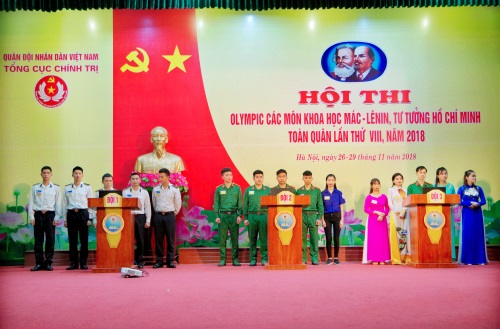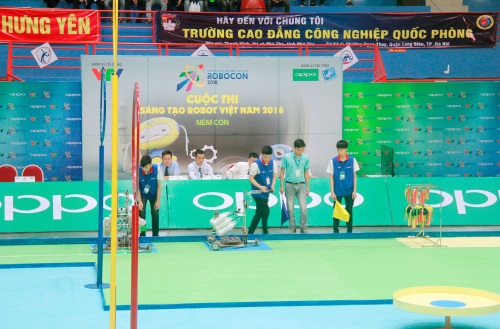Military Industrial College follows Uncle Ho’s teachings and enhances training quality
Perceiving the Politburo’s Directive 05-CT/TW (12th tenure) on studying and following Ho Chi Minh’s ideology, morality, and style, the Military Industrial College (MIC) has effectively implemented this Directive in accordance with its characteristics, functions, and missions, thus contributing to promoting education, training quality and building pure, robust party organisations and a comprehensively strong college.
The Military Industrial College, General Department of Defence Industry is tasked with providing short-term courses on economics, techniques, and vocations; training technical personnel and highly skilled workers for the Defence Industry and the entire military; and collaborating with 12 universities and colleges in the northwest region in providing defence and security education for students and training human resources for industrialisation and modernisation. In addition, it conducts research and applies science and technologies to defence training and production; makes the most of existing capabilities for manufacture, business, and service as provided in law; readily undertakes and accomplishes other missions.
 |
| The College’s team (middle) taking part in the Army-wide Knowledge Contest on Marxism-Leninism and Ho Chi Minh’s ideology in 2018 |
In view of its assigned tasks, apart from many advantages, the College also faces a number of difficulties. Every year, the Ministry of National Defence (MND) gradually reduces training quotas on civilians in military schools. The entrance quality of students is unequal. There is a lack of management cadres and teachers. Educational, training facilities are not synchronous. Meanwhile, production and business activities in the General Department of Defence Industry in particular and the entire military in general cope with many difficulties, which affects the employment of its graduate students.
Clearly understanding the situation and being imbued with Uncle Ho’s teaching: “we all vie to teach well and learn well, no matter what the difficulties are,” the College Party Committee and Board of Directors have laid out many policies and solutions to direct and heighten proactiveness and creativity in overcoming difficulties to improve educational, training quality, in which the strengthening of studying and following Uncle Ho’s teaching is at the forefront. Consequently, the College’s educational, training quality is continuously improved. It was awarded a certificate of merit for outstanding achievements in education and training by the General Staff Department and the “Determination to Win” Unit by the General Department of Defence Industry in 2018.
To record the above achievements, the College Party Committee and Board of Directors have constantly educated their cadres, teachers, cadets, and students to increase their awareness and responsibility for educational, training mission. In addition to political education, the College also focuses on propagandising the goals, significance, and importance of current vocational training work, especially the training of highly skilled human resources for national industrialisation and modernisation, building and developing defence industry, building the military, and safeguarding the Homeland. Moreover, it promotes propaganda on the College’s position and prestige in the system of professional training institutions in the military and society in the cause of establishing and developing the defence industry and operations of plants in the military, thereby contributing to correctly guiding cadets and students’ careers, shaping their positive motives and attitudes toward study, and creating momentum to encourage cadres and teachers to heighten their consciousness and responsibility for getting over difficulties and keeping their minds on their educational, training work.
Deeply grasping Ho Chi Minh’s ideology: “… without teachers means without education,” the College Party Executive Committee and Board of Directors concentrate on leading and directing the standardization of teachers and management cadres. During its implementation process, it step by step develops a corps of cadres and teachers, which has an appropriate strength and structure and increasingly advanced quality. Every year, the College selects cadres and teachers to send to schools inside and outside the military, ensuring democracy, closeness, and right criteria; and prioritizes the selection of young cadres and teachers with competence and dedication to their jobs to send to postgraduate courses in both domestic and foreign colleges and universities. The focus is on improving cadres and teachers’ academic standard, pedagogical skills, and practical knowledge; heightening self-study; and closely aligning training with use of cadres and teachers. Furthermore, the College takes initiative in discovering and making requests for strengthening its corps of cadres and teachers by good people from academies, colleges, offices, and units in the whole military. Additionally, it also effectively conducts teachers’ meetings, cultivation of pedagogical knowledge and activities, field trips, school visits, etc., with a view to consolidating the practical knowledge in plants. Over time, the College has collaborated with Shelton English Centre to teach English and High-tech Centre, the Military Technical Academy to open a high-tech welding class for its cadres and teachers. Faculties and shops have taken initiative in fostering new teachers’ specialized knowledge, pedagogical skills, practice capabilities, information technology, and teaching methodologies. Therefore, the College’s cadres and teachers always possess good political standard, professional ethics, academic standard, pedagogical skill, teaching ability, scientific research, student management. Today, almost 96 per cent of its cadres and teachers have graduate degrees. Nearly half of them have postgraduate degrees.
 |
| The College’s team participating in the 2018 Vietnam Robot Contest |
Given its function as a professional training enterprise, the College focuses on innovating content, programs, methodologies, and forms of teaching and learning in the direction of improving learners’ practice capacity to meet employers’ demands. To follow Uncle Ho’s teaching: “practicability and thoroughness are better than numerousness in training” and grasp resolutions and directives of the Party and Central Military Commission (CMC) on education and training, particularly Resolution of the 8th Plenum of the Party Central Committee (11th Tenure) on renewing fundamentally and comprehensively education and training, the College is committed to the learner-centered approach. Accordingly, it has introduced 6 programs to tertiary level and 22 programs to intermediate level since the school year of 2017-2018. During its implementation process, the College reviews and adjusts the training programs from primary to tertiary level; adds new subjects and content; and enhances association to diversify training forms and careers and ensure succession and alignment with the development goals and requirements of the defence industry, military, society, and development of science and technology. The College collaborates with several plant and manufacturing enterprises to learn about demands for human resources to develop its training programs in a close association with employers’ requirements. Priorities are given to cultivating specialized technical professions in defence industry such as chemistry explosives technology, design technology of weapon systems, optics, military electronics, control technology, production automation, and so on. During its training process, the College is always active in innovating methodologies and modes of teaching and learning to ensure alignment with realities, scientism, and effectiveness. It coordinates with training institutions and plants in the area to provide education from intermediate to undergraduate education. In the teaching process, the teachers apply active teaching and learning methodologies, integrated teaching methods, and advanced teaching and learning methods. The College also brings its cadets to partnership units to work as apprentices, applies information technology to exams, tests, and assessment of training quality, and so forth. As a result, its training quality is continuously improved. Every year, all cadets and students graduate college, in which 55 per cent of them are graded as good and excellent. Through practical surveys, all of the College’s graduates working for plants and manufacturing facilities have good skills and industrial style and are appreciated by employers.
Moreover, the College attaches special attention to building a healthy military pedagogical environment; speeds up administrative reform; promotes good order and discipline; enhances the management effectiveness and efficiency of party committees and leading cadres at all levels; and brings into play the role of organisations to create solidarity and unity within the College. Offices and units well leverage the role of cultural institutions; increase their awareness of situations to timely detect, prevent, and resolutely punish violations of law and regulations; proactively prevent the intrusion of social evils into the Colleges; and minimise violations of discipline. Besides, it actively struggles against the degradation in political ideology, morality and lifestyle, “self-evolution” and “self-transformation” within the Party, etc., making contribution to establishing a healthy military pedagogical cultural environment. Apart from paying attention to cultural, spiritual life, it is also committed to developing regulations on investment, acquisition, and management of technical materials, commodities, equipment, etc., ensuring transparency and democracy. The College effectively combines training with production and service in order to perfect the skills of cadets and students and gradually improve the teaching and learning conditions, which enables cadres, teachers, cadets, and students to bring into play their sense of responsibility and keep their minds on their work and study. As a result of the healthy pedagogical environment, organisations well perform their advisory, management functions and carry out plans in a scientific, modernized, unified manner. The movement for doing scientific research and developing and applying information technology to training is strengthened. The development of plans, conduct of training, and participation in the Robot Contest yield good results.
Leveraging the recorded achievements, in the coming time, the Military Industrial College continues to step up the following of Uncle Ho’s teachings by means of practical, concrete actions, contributing to improving its educational, training quality. The College strives to be qualified as a nationally standardized college.
Lieutenant Colonel Le To Huu, M.A.
Commissar of the College